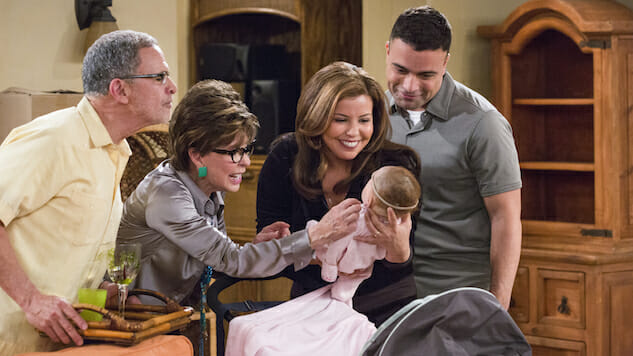How One Day at a Time Makes Sitcom Magic for the Modern Age
Photo: Courtesy of Netflix
This is it!
Netflix’s One Day at a Time is exactly the kind of show this golden age of peak TV should be delivering.
Introduced with little fanfare last January, the reboot of the 1970s comedy pulled off the trick of simultaneously being a nostalgic throwback and a forward-thinking comedy ready to tackle today’s world. It blended the traditional four-camera sitcom format with contemporary storylines about post-traumatic stress disorder, wage inequality (long before the Michelle Williams/Mark Wahlberg fiasco) and adolescent sexuality. To the uninitiated, the series follows a Cuban American family led by Justina Machado as Penelope, a recently separated veteran raising her two adolescent children—Elena (Isabella Gomez) and Alex (Marcel Ruiz)—with the help of her overbearing mother, Lydia (Rita Moreno), and her landlord, Schneider (Todd Grinnell).
Paste had a chance to attend the taping of the eighth episode of the second season, entitled “What Happened.” The episode flashes back to the Elena’s birth, juxtaposing it with her current relationship with her father. Part of the joy of attending a taping is seeing how the sausage gets made. Should a 2001 Schneider with his spiked blond hair be referred to as Mark McGrath or Jamie Kennedy? (They go with McGrath.) Should Penelope refer to Jackie Robinson or an astronaut on the moon when comparing what it will be like to be the first Cuban couple not to live with their parents (they go with the moon). And part of it is getting to see legendary executive producer Norman Lear in action. He receives a standing ovation (as he should) when he comes out to talk and tells the crowd that Michael Harrington, Pat Harrington Jr.’s (the original Schneider) son, is in the audience. “He’s a wonderful musician and a great guy,” Lear says of Harrington. “I’ve watched the miracle of another Schneider in this show,” he goes on to say. “We couldn’t believe there could be another. Somebody would have to do an imitation of Pat. Along comes this wonderful Todd Grinnell and our showrunners and writers and they create an entirely different character.”
Later, the comedian who’s there to entertain the audience in between takes talks to Lear’s 13-year-old granddaughter, who says that her grandfather was having breakfast with her one morning and told her, “Every moment in my life has led up to this moment to be with you.” The audience is appropriately awed by that comment.
And that’s not all! The equally legendary Moreno dances with guest star Tony Plana between takes. When she temporarily forgets her line, something she laughingly refers to as a “Moreno moment,” she deadpans, “I think it’s my turn. I was wondering what that silence was about.” She charmingly corrects her introduction as an EGOT. She’s actually a KEGOT, having won not only an Emmy, Grammy, Oscar and Tony, but also the Kennedy Center Honors. Later, she brings out a glass of wine to the curtain call. No matter how much you love Moreno, you will love her more after watching the renowned actress in action.
The 95-year-old Lear is having a ball with the revival. “I can’t find the words to express how much I get from working with these glorious people,” he told television critics at a press conference. “I love this show. It’s a great kick.”
But Lear takes little credit for the show’s success, citing executive producers Mike Royce and Gloria Calderon Kellett as the geniuses behind the series. “110 percent of everything creative in this show is the work of the two people who are leading it, and they are Mike and Gloria. So I visit it. I am a guest there. I love that everybody thinks it’s my taste, because it is my taste, but it’s their execution. It’s all together them.”
-

-

-

-

-

-

-

-

-

-

-

-

-

-

-

-

-

-

-

-

-

-

-

-

-

-

-

-

-

-

-

-

-

-

-

-

-

-

-

-








































